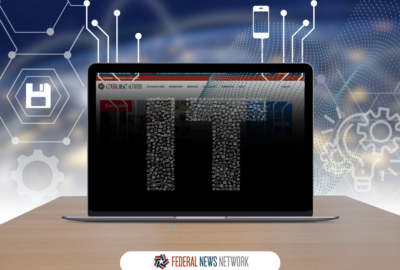Trump team vulnerable to cyber threats by not signing transition memos, experts warn
Transition experts say cooperating with GSA is critical to ensure the Trump administration has the cybersecurity resources necessary to protect sensitive data.
Worried about Schedule F and the future of your job? Excited to see if DOGE can improve government efficiency? Want to know more about the proposed pick to head up your department? Federal News Network is tracking all things transition-related, as the 47th administration’s plans for the federal workforce take shape. Visit our Tracking the Transition page to keep up with the latest developments.
President-elect Donald Trump’s transition team is charting its own course to prepare for the new administration.
The Trump team, so far, has not yet signed memorandums of understanding with the General Services Administration or the White House that are a standard part of the presidential transition process.
Trump transition officials say their team is self-funding their work through private donations, in an effort to prevent the Biden administration from interfering with its plans.
But transition experts say those MOUs are critical for the incoming team to get cybersecurity protections from the federal government. Not signing those memos, they warn, makes the transition team more vulnerable to threats.
White House Press Secretary Karine Jean-Pierre told reporters on Thursday that the Trump transition team has not yet signed MOUs with GSA or the White House.
President Joe Biden, she added, called Trump and “assured him that he would direct his entire administration to work with his team to ensure a peaceful and orderly transition of power.”
“We’re going to leave that line of communications open. We’re going to be helpful here. We want to have an effective, efficient transition of power. And so, we are ready to provide that,” Jean-Pierre said.
Biden will meet with Trump at the White House on Wednesday.
Robert F. Kennedy, Jr., one of about 20 officials working on the Trump transition team, said on the campaign trail last month that the Trump campaign is largely self-financing its transition operations, rather than accepting congressionally appropriated funds for the transition.
“He got private donors to fund it,” Kennedy said.
Former Rep. Tulsi Gabbard (D-Hawaii), another Trump transition leader, said the team is refusing federal transition resources to prevent the Biden team from undermining its transition plans.
“They’re freaking out because they can’t place their moles within the transition team to try to figure out what Donald Trump is doing, so that they can spin up their media propaganda machines, and try to preempt and undermine the work that we are doing to bring great patriots together to actually fix the government,” Gabbard said.
Heath Brown, an associate professor of public policy at the John Jay College of Criminal Justice, who specializes in presidential transitions, said cooperating with GSA is critical to ensure the incoming administration has the cybersecurity resources necessary to protect sensitive information.
“We know there have been hacks of people involved peripherally in the Trump universe over the last six months. And I think the transition period would be ripe for cyber-attack,” Brown said. “They need to have a foolproof system in place to do so very, very quickly, or they risk a cyber-attack threatening not just their planning, but really the safety and security of the country.”
Trump campaign officials said in August that malicious actors backed by Iran hacked into its email system and stole sensitive internal documents.
Brown, who recently wrote a book about the Biden transition, said the team went to great lengths to protect incoming officials from malicious actors.
“Cybersecurity is what they cared about morning, noon and night. They cared about it so much,” Brown said. “They were worried about the potential that during the transition, the transition team’s files would be hacked. I think if they were to offer one piece of advice to the Trump transition team, it would be to pay very, very close attention to the cybersecurity infrastructure that the transition team is using.”
GSA said in a statement last Wednesday that it has “notified the Trump transition team of President-elect Trump’s eligibility for post-election services under the Presidential Transition Act, which are available after a concession.”
Those services include office space, IT equipment, office supplies vehicles and mail management.
Ron Eckstein, a spokesman for the Cybersecurity and Infrastructure Security Administration, said in a statement that “CISA is fully committed to a seamless transition,” and deferred further questions to the Trump transition team.
Brian Hughes, a Trump-Vance transition spokesperson, told Federal News Network that the “Trump-Vance transition lawyers continue to constructively engage with the Biden-Harris Administration lawyers regarding all agreements contemplated by the Presidential Transition Act.”
“We will update you once a decision is made,” Hughes said.
A former transition official who worked with the Trump team in 2016 told Federal News Network said cybersecurity should be a top concern for the incoming team.
“It’s the government-in-waiting, and foreign actors would be, presumably, trying to get access to things,” the transition official said. “It’s not the government, it’s outside the government. There’s only one president at a time. What the transition after the election does is it builds the new administration, like in a staging platform, so that it’s ready to sort of flip a switch on January 20.”
The transition official said that in addition to providing office space and supplies, GSA provides the incoming team with secure IT infrastructure and cybersecurity experts from across the federal government.
“An important element of that is secure IT devices and support. We had embedded federal government IT people working in our transition office. Cybersecurity and counterintelligence is part of it,” the official said.
The former transition official said the Trump team had completed its MOU with the White House before Election Day in 2016.
“That governs the process by which the landing teams go into the federal agencies, which typically they start about a week after the election,” the former transition official said.
Without the cybersecurity protections of the federal government, Brown said it would be difficult for the Trump team to stand up the same level of protection on its own.
“It’s very hard to build, practically from scratch. They’re going to be onboarding a huge number of people very, very quickly. That means orienting them to the cyber setup that they have. Any help that is offered to them in this area, it would be wise for them to take. Turning down help, especially on cyber, I think, would be a very concerning decision to make,” Brown said.
“Turning down cooperation with the GSA would also be turning down some of the cybersecurity expertise of the federal government. To go at this alone, without the aid of GSA and the technology expertise around cyber, would be, I think, a very risky decision,” he added.
Copyright © 2025 Federal News Network. All rights reserved. This website is not intended for users located within the European Economic Area.
Jory Heckman is a reporter at Federal News Network covering U.S. Postal Service, IRS, big data and technology issues.
Follow @jheckmanWFED






